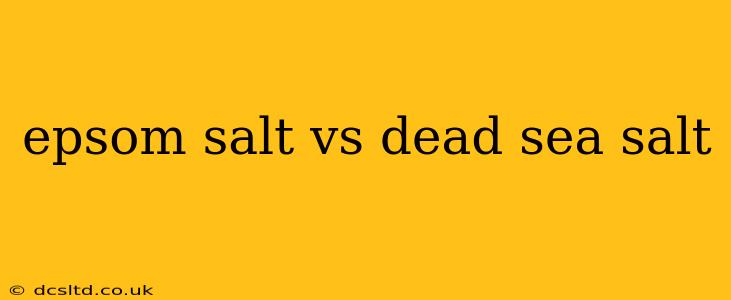Choosing between Epsom salt and Dead Sea salt can feel overwhelming, especially with the plethora of claims surrounding each. Both are popular additions to bathwater, touted for their purported health benefits, but their compositions and effects differ significantly. This comprehensive guide will clarify the distinctions between these two salts, helping you choose the best option for your needs.
What is Epsom Salt?
Epsom salt, chemically known as magnesium sulfate (MgSO₄), is not actually salt in the traditional culinary sense. It's a naturally occurring mineral compound found in mineral springs and salt lakes. Its unique composition is what gives it distinct properties. Epsom salt is readily absorbed through the skin, leading to many of its purported health advantages.
What is Dead Sea Salt?
Dead Sea salt, conversely, is a true salt comprised of various minerals, with a high concentration of magnesium, calcium, potassium, and bromide. It's harvested from the Dead Sea, a landlocked salt lake in the Middle East renowned for its exceptionally high mineral content and salinity. The high mineral concentration is often cited as the key to its claimed therapeutic properties.
Epsom Salt vs. Dead Sea Salt: Key Differences
Here's a table summarizing the key differences:
| Feature | Epsom Salt (Magnesium Sulfate) | Dead Sea Salt (Various Minerals) |
|---|---|---|
| Chemical Composition | Primarily Magnesium Sulfate | Complex mix of minerals (Mg, Ca, K, Br, etc.) |
| Mineral Content | Primarily Magnesium and Sulfate | Rich in multiple minerals |
| Texture | Fine, white crystals | Can vary, often coarser crystals |
| Absorption | Readily absorbed through skin | Absorbed, but less readily than Epsom salt |
| Primary Claimed Benefits | Muscle relaxation, pain relief, detoxification | Skin soothing, exfoliation, mineral replenishment |
What are the purported benefits of Epsom salt?
Muscle Relaxation and Pain Relief:
Epsom salt baths are widely used for muscle soreness and pain relief. The magnesium absorbed through the skin is believed to help relax muscles and reduce inflammation. This makes it a popular choice for athletes and individuals experiencing muscle aches.
Detoxification:
While the "detoxification" claims surrounding Epsom salts are often debated, the magnesium and sulfate ions may play a role in drawing out toxins through the skin. This effect is not fully understood and further research is needed.
Improved Sleep:
Magnesium is crucial for regulating sleep cycles. Epsom salt baths before bed may contribute to better sleep quality due to the magnesium absorption.
What are the purported benefits of Dead Sea Salt?
Skin Soothing and Exfoliation:
Dead Sea salt's high mineral content is believed to soothe various skin conditions such as eczema and psoriasis. The coarse texture can also gently exfoliate the skin, removing dead skin cells.
Mineral Replenishment:
The diverse mineral composition of Dead Sea salt may help replenish minerals lost through sweat or environmental factors. This purported replenishment contributes to the skin's overall health and appearance.
Reduced Inflammation:
Similar to Epsom salt, some believe the mineral content of Dead Sea salt contributes to anti-inflammatory effects on the skin.
Which salt is right for me?
The best choice depends on your individual needs and preferences.
- Choose Epsom salt if: You primarily seek muscle relaxation, pain relief, or potentially improved sleep.
- Choose Dead Sea salt if: You're looking to soothe skin conditions, exfoliate, and potentially benefit from a broader spectrum of minerals.
It's also important to note that while both salts are generally safe for topical use, individuals with certain conditions should consult a doctor before using them.
Can I mix Epsom salt and Dead Sea salt?
You can indeed mix Epsom salt and Dead Sea salt in your bath for a combined effect. Experiment with different ratios to find a combination that works best for you.
Are there any potential side effects?
While generally safe, excessive use of either salt can lead to skin dryness or irritation for some individuals. Start with a small amount and gradually increase as tolerated. If you experience any adverse effects, discontinue use and consult a healthcare professional.
This detailed comparison should empower you to make an informed decision when choosing between Epsom salt and Dead Sea salt for your bath and body needs. Remember to consult with a doctor or dermatologist if you have any underlying health conditions before incorporating either salt into your routine.
